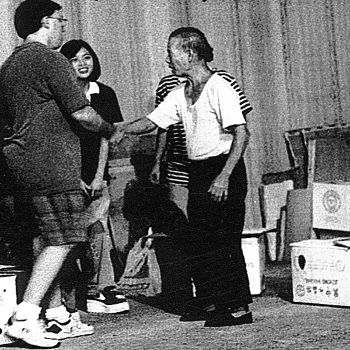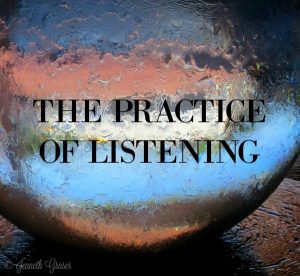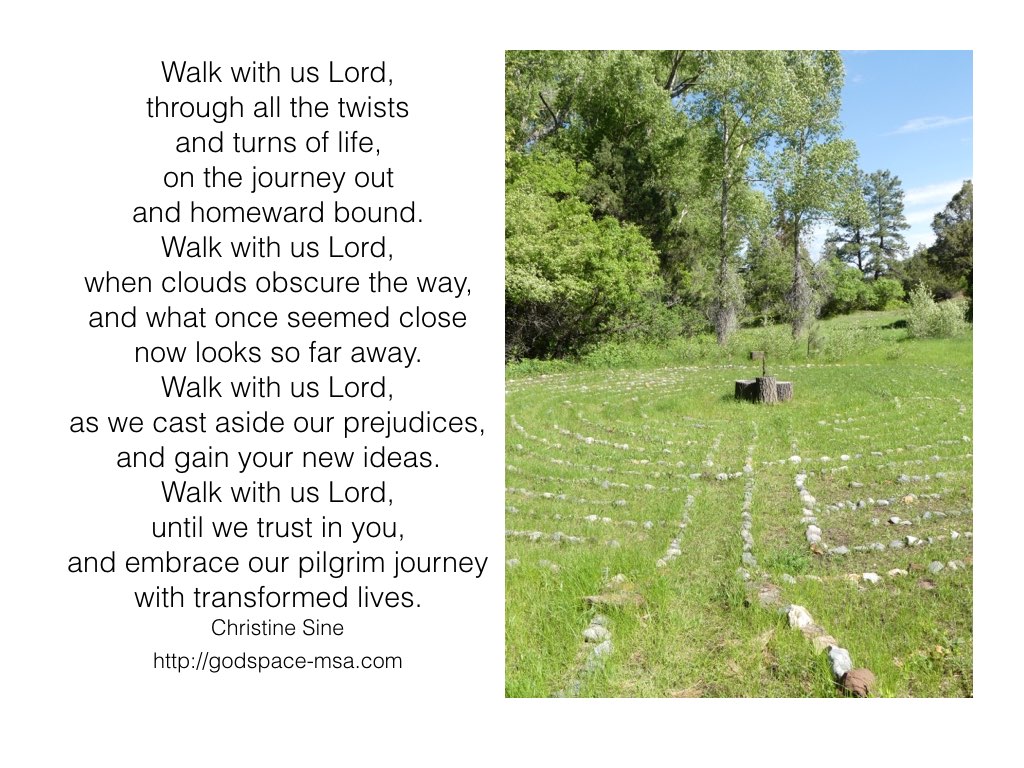What to say about fathers, I thought to myself, and prayed, which has not already been said? I have known a lot of fathers, some wonderful like my own, some pretty good, some indifferent, some harsh and abusive. So much judgement we bring to the idea of fathers, measuring them against one another and deciding on their merit or otherwise! We do the same to mothers of course, and we blame the failures of our lives (often with good cause, often without) on our parents, and seldom credit them with our successes.
But the truth is that there are as many different fathers as there are men. And that all men are father figures whether or not they have had their own children. Oh, we all have our ideas of what a father should be like, and our own regrets perhaps, about the fathering we did not receive, or we did not give. We think, maybe, that a father should be strong, a doler-out of discipline or a teller of epic tales of derring-do. Some kind of epitome of masculinity, depicting all the best qualities of whatever we’ve decided maleness ought to be.
In point of fact, there is only one perfect father, and the comparison with him is always going to be a rather unfair one, yet we do it instinctively, and perhaps that is why parenthood is one of the toughest and least respected roles in our society. It is also one of the most important to do well.
Pondering a little more, I think that acceptance of the idea that our dads did and are doing their best is the wisest course, putting our judgement to one side. Because whatever standards our dads did or don’t measure up to, the best thing that an earthly father can do is be present. To just be himself, offering of himself, loving us as himself. Just as the manliest thing a man can be is himself, whole and not held to anyone else’s idea of what he should constitute as a human being.
Is the worst thing a father can be, then, absent? Well outside of abuse, perhaps. But that depends what we mean. Sometimes the best dads are ones who don’t live with their children, but who still spend time with them, making sacrifices of hours, money and travel to do so. So it is maybe emotional absence that is the most harmful, and emotional presence the best thing a man can do for his kids.
That we or they know love, this is all that matters. It might only be half an hour being pushed on the swings in the park once a fortnight, or a phone call grabbed between shifts. As long as during that short time there is love, that’s being a great dad. So is giving up your job to look after the children, as both men and women do. Because sacrifice and time are key in any act of loving.
So this Father’s Day, I counsel that we give our dads some acceptance, that we cut them some slack. That we let them relax into being themselves with us. That we recognise that they do all deserve that “Best Dad in the World” card. Because there is no magic formula to family, and if we are showing up, we are doing it right.
©Keren Dibbens-Wyatt
By Andy Wade –
It continually amazes me that the Creator of the entire universe, of all things visible and invisible, cares so deeply for each tiny element formed by his hands. God beckons us into relationship, into healing, into wholeness, and then invites us to join hands with the Almighty to bring healing to the whole creation. This God, this loving, grace-filled God, calls us out of isolation and into relationship.
Even our deepest brokenness cannot separate us from the love of God in Christ Jesus. Nor can it sever us from the web of life, each part fashioned and sustained by the breath of love. As we draw near to God we also draw near to one another and to all that God created and called very good.
God of light and life, let you light shine and illuminate the path before us.
Holy Interruptions
By Andy Wade –
It was already a busy week when I got the call, “Hello, Andy? Vincent (not his real name) needs to get to the hospital right away. Can you come help me?”
It wasn’t the first emergency in Vincent’s life. In fact, in the past year he had been on life support two times and not expected to live. It was summer, the Hood River Warming Shelter was closed, and I was busy. But Vincent wasn’t just some “homeless guy”; he was a friend. One of the important aspects of how we run the shelter is to remove the stigma of homelessness by breaking down the “us – them” mentality and understanding that it’s only us.
Vincent was not “like me”. And yet, the more I hung around him, the more alike I realized we were. I didn’t really want to get involved in another crisis. I had enough going on. But “Yes” was the only answer.
I was thinking about this story as I reflected on this month’s theme: Listening. Really it was listening that got me into this. At the time it was listening both to the plea for help from Vincent’s wife as well as listening to the quiet voice of God to get involved. None of this was about guilt but more about God pulling me out of my self-centeredness and into the lives of others. God was inviting me to love both God and neighbor.
As I pulled my car into the camp I could see that Vincent was in distress. He would drift from lucidity to completely passed out. Over the years alcohol had ravaged his body, and his body was now screaming, “Enough!” With a bit of work, we loaded Vincent into the car and rushed off to the hospital. After a few hours there, it was decided they couldn’t help him in the way he needed, and he was rushed to Portland for further care.
Vincent drifted in and out of consciousness as he lay on his bed in the hospital. It appeared that the damage to his body had reached a tipping point and could take no more. But he hung on… and on… and on. Then a remarkable thing happened: he began to get well. Just over a month after he entered the hospital, Vincent was released. He still had no home to go to, but he was alive! And when I say “alive”, I mean truly alive. After over a month of forced sobriety, Vincent’s deep blue eyes sparkled, his mind was sharp, and he was beyond happy.
Life hadn’t gotten easier either. I really don’t know how he managed it, but as his wife and a campmate continued to suck down Hurricane beer, Vincent stood firm in his resolve not to drink. Soon he was hired as a dispatcher for a local taxi service. Although Vincent had always been a very upbeat person, I had never seen him so energized and happy.
Here’s the thing: I could have said no to that phone call. I could have stopped up my ears to the voice of God and the plea of my neighbor and friend. I could have done that and received praise for setting boundaries from some who thought I was already over-involved. But I would have missed out. I’m sure if I had responded, “I’m sorry, I just can’t do this today”, they would have found someone else. I was not Vincent’s savior. But God interrupted my life and invited me beyond myself. And what God invited me into was more than I could have ever asked or even imagined.
I wish that’s how the story ended. I like happy endings. But life is messier than that. 73 days after Vincent’s last drink he had a “cardiac event” while on the job, slipped into a coma and was placed on life support. Over the week that followed many friends came to visit him. For all the difficulties in Vincent’s life, he was deeply loved. A decision was finally made that it was time to take him off life support. As his closest family and friends surrounding him, we said our goodbyes, joined hands, prayed, cried, and watched as his last breath escaped his lips. It was finished.
Like so many living on the streets, Vincent was a follower of Jesus. Like all of us, he wrestled with his demons. It would be easy to surmise that his demon had won, but that would be so far from the truth. Although alcohol ravaged his body, Vincent lived his final 73 days in victory. He inspired so many of us with his joy, laughter, and those penetrating blue eyes that seemed to grow brighter every day he was free from his demon.
I miss him. It’s been nearly three years since his death, but every once-in-awhile I still catch myself looking for him at the places he used to hang out.
Through this experience God taught me to be awake, to listen, to look, to expect holy interruptions. They actually happen all the time, but we have to have eyes to see and ears to hear. What at first may appear as a disruption to routine may actually be God’s invitation to participate in something beautiful. Are you listening?

Mr. Lee is another friend who lived outside. I met him on the streets of Hong Kong where, with other friends, we shared many a conversation.
In Memory of Mr. Lee
Warm hand outstretched in greeting.
Who would have thought this pearl of friendship
Would be hidden in a simple box of rice,
Purchased with only a few kind words?
Carelessly tossed on the cool, damp concrete.
For ten years this was home.
For two years a place of fellowship
Where those filled with Jesus’ Spirit
Encountered another created in God’s image.
Tossed aside by the masses
Despised, rejected, familiar with grief.
A painful reminder of how easily we
Abandon the One who fashions us in His likeness.
Slipping from life just as you lived,
Alone, unnoticed by passersby.
Your home is now swept clean
The brutal efficiency of the city
Leaves no trace
That this corner was once a place of worship.
In the midst of the crowds, dirt, rats, and cardboard
We both encountered the love and grace of God.
May we meet once more
At the feast of God,
The banquet of life
Where death, sorrow, and crying are no more.
“This is my Son
Whom I love,
Listen to him.”
Mark 9:7
This is one of my favourite scriptures. If you place yourself at the scene of the Mount of Transfiguration, you can almost hear the voice of God booming with love over his Beloved Son, Jesus. Peter makes a suggestion that they stay there and build a shelter. It is very tempting to think of setting up a shelter in the glory of God’s presence. But the reality of His presence can only be conveyed to others, when we take what we have heard, down the mountain and into our daily lives.
I received some life changing teaching in the year 2000 from Mark Virkler on how to commune with God in a conversational way, by using journaling as a listening prayer tool. This helped me to break through in my relationship with God, a tendency towards self-reproach, which was often draining the enjoyment out of my times with God. The love God has for Jesus inspires me to listen to Him. As I come to learn to love myself with the love God has for me, it opens up a way to hear in a deeper and more meaningful way.
The practice of listening is the joy of relationship. True engaged listening is a gift we give to ourselves, to others and to God. Before we were married, my husband Karl and I went to a Listening course which opened up some meaningful discussion. And I began to put into practice some of these listening skills when I realised that my style of showing how I listened so well, by finishing off my husband’s sentences all the time, was not his way of feeling listened to at all! And I’m still working on it!
We can all learn to practice the skills of listening. The word “Listen!” can even hold some negative connotations for parents who are trying to make themselves heard with their kids. I hear myself saying that with a measure of exasperation sometimes, even though I realise that you cannot force listening. For active listening to take place, we need to come together with our children and have unbroken, respectful communication which happens best in a space of loving connection. Ideally yes, but in actuality, not always! But again, I’m working on it! How wonderful to know that God is always available with the best listening ears as our Father and Mother, who is constantly inviting us into relational communion.
Of great importance in the practice of listening is to make time for listening to yourself. This is just as important as listening to others, because when you feel heard by your own self, you will feel more able to listen to the thoughts and opinions of others. Sometimes we can rush around so much, our emotions and thoughts are trying to speak to us, but we don’t give them space to be heard.
The wisdom of the Spirit is communicated through quiet inner listening. When we allow this wisdom to be communicated, we don’t feel as much inclined to de-stress in other unhealthy ways. And we come to realise this will not come through other people’s affirmations, but through becoming the kindest friend towards ourselves in the knowledge that we are daughters and sons of the Living God. Unconditional love is one of the most important commandments, as Jesus explained that to Love God, love your neighbour as you love yourself, sums up all the law and the prophets. (Matthew 22:37-40) It is a simple and yet profound truth!
All to say, listening is a beautiful and very valuable gift that is rare in our society. It is something to be nourished and encouraged mindfully amongst ourselves. It is a practice I desire to deepen in my life and so I share with you some of the things that help me along the way:
- Lie flat, or sit down in a comfortable place and become aware of your breathing. As you breathe in and out and focus your attention on the rhythm of your breath, you become more able to hear the wisdom of God in the still small voice of silence.
- https://gravitycenter.com/practice/breath-prayer/
- Quiet music without words as a backdrop of prayer enriches the listening experience.
- I can recommend John Belt. You may find out more and download some music here:
- http://www.overflowglobal.com/
- As you relax your mind and cease striving, conversational prayer begins to open up.
- You can listen to Mark Virkler’s Keys to hearing God’s voice here:
- http://www.cwgministries.org/Four-Keys-to-Hearing-Gods-Voice
- Time set apart for self nurture and listening in these ways helps to balance the body, soul and mind with the daily requirements of life.
- This wonderful Centering Prayer App from Contemplative Outreach is a very helpful: http://www.contemplativeoutreach.org/centering-prayer-mobile-app
- Listening to nature helps us to slow into the pace of God’s ways, as we observe the constant rhythmic and cyclical patterns in all of creation. Many messages are waiting for us in nature as parables for us to hear.
- Looking at your favourite art pieces and waiting with the visual experience, allows room for listening. A painting that speaks to you in volumes may hold a message God has for you at the present time.
- Listening to others with our full attention is a wonderful practice of silencing the mind. We put aside finishing other people’s sentences, jumping in with advice or solutions, and trying to control the conversation. We can all learn to receive others more fully as we offer the gift of fully present listening. There is a joy in feeling fully received when you are listened to without distraction. We can learn to offer this joyful practice to others, because we know the healing it brings when we have experienced this ourselves.
- Meditative practices such as playing an instrument, colouring in, Zentangle, dance, mindful exercise, walking a labyrinth, painting… there are many creative ways that help us to slow down and engage with the present moment of listening.
- A meditative practice to try is Zentangle, you can find out more here:http://www.wikihow.com/Make-a-Zentangle
- Here are some finger labyrinths you may like to try: http://labyrinths.org/resources/resourcesforfacilitators.html
We are all called to listen on a daily basis, but mindful listening is something that only happens as we become more aware and practice. A precious gift given to another person who has felt heard in the deeper sense, releases a healing flow.
In which ways are you feeling drawn to practice listening to yourself, to others and to God?
Take some time to rest with God and this beautiful song “Listen” by Laura Woodley Osman:
The great Canadian songwriter and rock singer Leonard Cohen said it best for me in his song called “Anthem.” There’s a line that echoes in my soul: “There is a crack, a crack in everything. That’s how the light gets in.”[i] I was not raised to think like that. In my world, scars were a sign of mistakes, failures or accidents. They were to be avoided in our Scandinavian family. If exposed, they were quickly subdued and forgotten. But the cracks aren’t magically sealed and the scars aren’t all healed. We are not just some of us reclamation projects; we are all in need of grace because we all bump up against life in the night. Unless we are dishonest with ourselves, we all face the limitations of pain, suffering, scars and failure. Now this Canadian musical legend tells me that light comes through the cracks? Through the scars?
Listening is the heart of Christian spirituality. But to listen in the silence? To listen in the darkness? To listen and hear only the sound of your pain, fear or loneliness? Now it sounds like a contradiction or a jarring juxtaposition of ideas. How does God speak to us in the darkness? What does it mean to listen when there is only echoing silence, hollow emptiness? A young slave girl called it “The day life turned into nothing this world could fix.”[ii]
Surprised by Lament
It was a particularly hot July day in Boston. I was taking classes for professional development in a program that attracted mostly Roman Catholic educators and priests. I am an ordained American Baptist who spends time in Anglican worship these days.
I had been invited to attend the daily worship time on that Wednesday in July. To Gasson Hall I went and joined a group of about seventy people from around the world: the Philippines, El Salvador, Northern Ireland, North America, Australia and England. In the opening words I was invited to worship in a way I had ever experienced in any other setting. I was asked to join sisters and brothers of faith to cry out to God in the language of lament. To complain to God about the condition of the world. To decry the violence and shameful oppression under which some in that very room lived. To complain that the universe was not as it should be but instead broken, askew, distorted. To incriminate God for silence, inaction and distance. I held back and remained detached from the prayers of lament because I did not know the language of lament. It was not part of the conservative theology or spiritual practices of my past. But though I had no experience with the language, I knew the experience well. I had lived long enough to know the cry of lament may be more the rule than the exception. What some call shalom shattered is not just a rare event; it is the common story of our humanity.
The language of lament is faithful speech addressed authentically to the listening God. It is perhaps the most unexpected source of formation in biblical spirituality. The language includes words of pain, horror, loss, grief, unmitigated suffering and inexplicable agony over the suffering and violence that occurs in the world; it is most dramatic, however, because it complains that God allows such suffering and violence to occur. It incriminates God in our suffering: God knows that we are in pain, and God chooses silence.
The spirituality of lament is not a place most expect to hear the thunder of God’s voice. It is a spirituality of “the terribleness of God,” as a friend once said. Why does God allow such pain? Why doesn’t God intervene to stop the slaughter of innocents in the Congo or Afghanistan or Angola? The poets know the language of lament and speak of human suffering as only they can. The words of Aeschylus were spoken by Robert Kennedy at the death of Martin Luther King Jr., only to be etched into his own gravestone five years later. The inscription echoes the words of any soul who has known grief.
Even in our sleep, pain which cannot forget falls drop by drop
upon the heart until, in our own despair, against our will,
comes wisdom through the awful grace of God.[iii]
Like the words of Aeschylus, Psalm 80:4-6 is a cry of unmitigated agony. The writer isn’t drafting an intellectual discussion of pain; this writer, one has said, “has been made to eat and drink sorrow.”[iv]
O Lord God of hosts,
how long will you be angry with your people’s prayers?
You have fed them with the bread of tears,
and given them tears to drink in full measure.
You make us the scorn of our neighbors;
our enemies laugh among themselves.
That’s the spirituality of lament. “Pain . . . falls drop by drop . . . until . . . comes wisdom through the awful grace of God.” Listening doesn’t promise to be a satisfying experience. Sometimes we listen in utter darkness. Sometimes we listen in the pain of unimaginable grief. Sometimes the only honest act of faith is to sit in the face of the worst that life can do to us. Why then listen at all?
Dan Allender wrote once that “Christians seldom sing in the minor key. We fear the somber; we seem to hold sorrow in low-esteem. We seem predisposed to fear lament as a quick slide into doubt and despair; failing to see that doubt and despair are the dark soil that is necessary to grow confidence and joy.”[v] Instead we seem ready to embrace the words in Harry Potter and the Prisoner of Azkaban, “Happiness can be found even in the darkest of times if one only remembers to turn on the light.”[vi] There’s a sense of optimism in that sentiment, but lament is a ferocious act of faith in the moments when one cannot even find the light.
Pain, sorrow, suffering, sadness and failure all separate us from one another. They move us into a place of isolation. Lament brings us together in a community of tears. In my early years in pastoral ministry I was assigned each week a list of “shut-ins” to go and visit. Shut-ins were shut out of the life of community in the church. Unable to participate in worship, fellowship or practices of community, they were marginalized by their pain unless the church or community remembered them and cared for them in their isolation. Something happens when pain is shouted to God in lament by a community of tears.
Today’s post is taken from chapter 7, “Heartbreak: Listening to Lament”” of Keith Anderson’s book The Spirituality of Listening. “
[i]Leonard Cohen, “Anthem,” The Future (Columbia, 1992). See lyrics at www.metrolyrics.com/anthem-lyrics-leonard-cohen.html.
[ii]Sue Monk Kidd, The Invention of Wings (London: Headline Publishing Group, 2014), 14.
[iii]See www.bartleby.com/73/1995.html.
[iv]Dan Allender, “The Hidden Hope of Lament,” Mars Hill Review (1994): 25-38.
[v]Ibid.
[vi]Harry Potter and the Prisoner of Azkaban, dir. Alfonso Cuaròn (Warner Bros., 2004).
the old pilgrims never returned to their own land and homestead without having lost a prejudice and gained a new idea instead. This is an attitude of life which constantly seeks new enlightenment, carries with it new won experiences and allows life to be influenced by it. (Pilgrimages Past and Present. Arne Bakken p19)
I have just returned from a wonderful week in Colorado where I renewed old friendships, made new ones and breathed in the beauty of God’s glorious creation. Along the way I conducted a couple of seminars, walked several labyrinths and enjoyed rich fellowship with my fellow travellers. It was a richly enlightening adventure, a pilgrimage that helped me to shed a little more of my cultural and religious prejudices and sent me home with new perceptions and understandings of life, faith and the world around me.
What made it a pilgrimage rather than an ordinary plane trip you may ask? My perceptions. On this trip I was looking for new insights and understanding. The transitions I am going through as I release my leadership position in Mustard Seed Associates challenge me to reevaluate every area of my life. What are my goals for the next five years? Where have I allowed non essentials to clutter my life and weigh me down on God’s journey? What are the new things God is speaking to me about that I have not noticed because I am bound by routines and habits that have become inflexible?
Every time we step out of our homes, or move away from our comfort zones we have the potential to embark on a pilgrimage, an experience that can transform our lives if only we will walk slowly, look around intently and listen closely to all we see and everyone we meet.
Pilgrimage is an attitude of life rather than a special journey as the quote above explains, though special journeys to holy sites often propel us into that mode of living in which we constantly seek the enlightenment we need to be transformed.
What is Your Response?
Have you ever been on pilgrimage? It is an experience that many of us long for but feel we don’t have time, energy or resource to embark on. Yet pilgrimage is indeed no more than a change of attitude that opens us up to new ideas and perceptions. Take time today to sit and think about your own life journey. Watch the video below and think of your own long journey to find out who you are.
Are there prejudices you need to let go of? Are there new ideas God is prompting you to accept? Are there new perceptions you have been slow to embrace?
As part of my meditation each morning I was reading through the prayer cards we created a couple of years ago. Today’s prayer is adapted from one of these cards and continue to mull over the question on the back and thought you might like to as well: Where today have you struck out of the familiar and found new friends, or a new perspective on the world?
You might also like to check out some previous posts on pilgrimage:
Pilgrimage and Walking the Rounds by Christine Valters Paintner
By Fran Pratt
God, Author of fun,
We acknowledge and offer thanks for our privilege:
To be able to lay aside our daily work,
Retreat from our homes (or into them),
Absorb the beauty of Creation,
Engage in relaxation.
We acknowledge that this is not a luxury available to all people in all cultures.
We acknowledge that privilege is a tricky thing.
We acknowledge that first-world culture is not always geared toward rest and balance.
We acknowledge that all creatures need times of play and fun.
If we are able to travel, we ask for protection along the way.
If we are with our families or extended families, we ask for relational harmony.
If we have been overworked, we ask for respite and renewal.
If we have been starved for beauty, we ask for a generous serving.
If we have been starved of fun, we ask for laughing recreation.
May we dunk ourselves in rivers, lakes, and oceans,
Breathe clean air,
Look deeply into flames,
Be comforted by dear presences,
Eat good food,
Imbibe water and wine,
Play and be childlike,
Sleep plentifully and peacefully.
And may we emerge from our vacations feeling vibrant and alive.
Amen
As an Amazon Associate, I receive a small amount for purchases made through appropriate links.
Thank you for supporting Godspace in this way.
When referencing or quoting Godspace Light, please be sure to include the Author (Christine Sine unless otherwise noted), the Title of the article or resource, the Source link where appropriate, and ©Godspacelight.com. Thank you!






